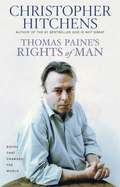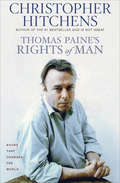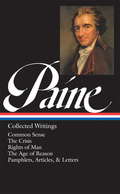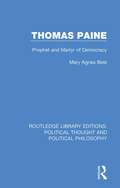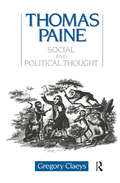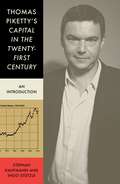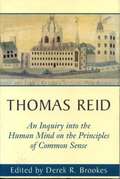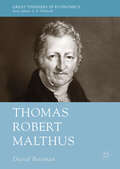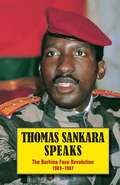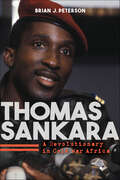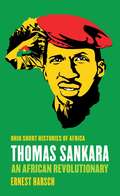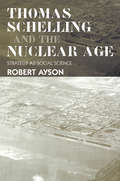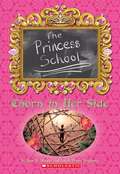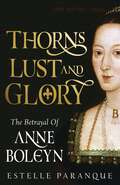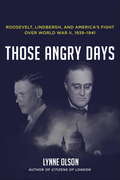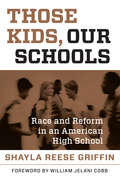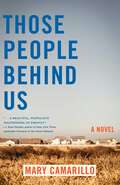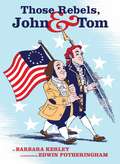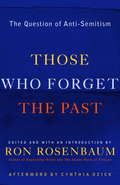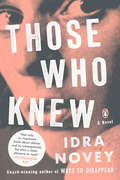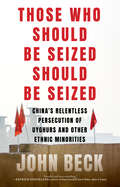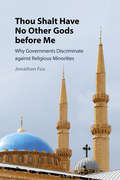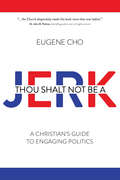- Table View
- List View
Thomas Paine's Rights of Man: A Biography
by Christopher HitchensThomas Paine's "Rights of Man" has been celebrated, criticized, maligned, suppressed, and co-opted, but Hitchens marvels at its forethought and revels in its contentiousness. In this book, he demonstrates how Paine's book forms the philosophical cornerstone of the U.S.
Thomas Paine's Rights of Man: A Biography (Books That Changed the World #6)
by Christopher HitchensChristopher Hitchens, the #1 New York Times bestselling author of God Is Not Great has been called a Tom Paine for our times, and in this addition to the Books that Changed the World Series, he vividly introduces Paine and his Declaration of the Rights of Man, the world’s foremost defense of democracy. Inspired by his outrage at Edmund Burke’s attack on the French Revolution, Paine’s text is a passionate defense of man’s inalienable rights, and the key to his reputation. Ever since the day of publication in 1791, Declaration of the Rights of Man has been celebrated, criticized, maligned, suppressed, and co-opted, but in Thomas Paine’s Rights of Man, Hitchens marvels at its forethought and revels in its contentiousness. Famous as a polemicist and provocative commentator, Hitchens is a political descendent of the great pamphleteer. In this engaging work he demonstrates how Thomas Paine’s book forms the philosophical cornerstone of the United States of America, and how "in a time when both rights and reason are under attack, the life and writing of Thomas Paine will always be part of the arsenal on which we shall need to depend.”
Thomas Paine: Common Sense / The American Crisis / Rights of
by Thomas PaineThomas Paine was the impassioned democratic voice of the Age of Revolution, and this volume brings together his best-known works: Common Sense, The American Crisis, Rights of Man, The Age of Reason, along with a selection of letters, articles and pamphlets that emphasizes Paine's American years. "I know not whether any man in the world," wrote John Adams in 1805, "has had more influence on its inhabitants or affairs for the last thirty years than Tom Paine." The impassioned democratic voice of the Age of Revolution, Paine wrote for his mass audience with vigor, clarity, and "common sense." This Library of America volume is the first major new edition of his work in 50 years, and the most comprehensive single-volume collection of his writings available. Paine came to America in 1774 at age 37 after a life of obscurity and failure in England. Within fourteen months he published Common Sense, the most influential pamphlet for the American Revolution, and began a career that would see him prosecuted in England, imprisoned and nearly executed in France, and hailed and reviled in the American nation he helped create. In Common Sense, Paine set forth an inspiring vision of an independent America as an asylum for freedom and an example of popular self-government in a world oppressed by despotism and hereditary privilege. The American Crisis, begun during "the times that try men's souls" in 1776, is a masterpiece of popular pamphleteering in which Paine vividly reports current developments, taunts and ridicules British adversaries, and enjoins his readers to remember the immense stakes of their struggle. Among the many other items included in the volume are the combative "Forester" letters, written in a reply to a Tory critic of Common Sense, and several pieces concerning the French Revolution, including an incisive argument against executing Louis XVI. Rights of Man (1791-1792), written in response to Edmund Burke's attacks on the French Revolution, is a bold vision of an egalitarian society founded on natural rights and unbound by tradition. Paine's detailed proposal for government assistance to the poor inspired generations of subsequent radicals and reformers. The Age of Reason (1794-1795), Paine's most controversial work, is an unrestrained assault on the authority of the Bible and a fervent defense of the benevolent God of deism. Included in this volume are a detailed chronology of Paine's life, informative notes, an essay on the complex printing history of Paine's work, and an index.
Thomas Paine: Prophet and Martyr of Democracy (Routledge Library Editions: Political Thought and Political Philosophy #8)
by Mary Agnes BestFirst published in 1927. This study explores Thomas Paine, an English-born American philosopher, activist, political theorist and revolutionary. The author examines Paine’s important aspects of Paine’s life, including his migration to the British Colonies, his participation in the American Revolution, and his imprisonment in Paris. This title will be of great interest to historians and those studying philosophy and politics.
Thomas Paine: Social and Political Thought
by Gregory ClaeysThis book investigates Thomas Paine's social and political thought in both its British and American moments. It examines the ways in which Paine's ideas were understood. The book restores him to the position his contemporaries accorded him, that of an important writer on politics and society.
Thomas Piketty's 'Capital in the Twenty First Century': An Introduction
by Alexander Locascio Ingo Stutzle Stephan KaufmannAn introduction to Thomas Piketty’s monumental workUS Nobel Prize winner Paul Krugman described Thomas Piketty’s Capital in the Twenty-First Century as “perhaps the most important book of the last decade”. It has sparked major international debates, dominated bestseller lists and generated a level of enthusiasm—as well as intense criticism—in a way no other recent economic or sociological work has. Piketty has been described as a new Karl Marx and placed in the same league as the economist John Maynard Keynes. The ‘rock star economist’s’ (Financial Times) underlying thesis: inequality under capitalism has reached dramatic proportions in the last few decades and continues to grow—and not by coincidence. Thus, a small elite becomes simultaneously richer and richer and more and more powerful.Given the sensational reception of the not-so-easily digested 800-page study that spans back to the eighteenth century, the question as to where the hype around Piketty’s book comes from deserves to be asked. What is correct in it? What are the criticisms of it? And what should we make of it—both of the book itself and of the criticism it has received? This book lays out the argument of Piketty’s monumental work in a compact and understandable format, while also investigating the controversies that this book has caused. In addition, the two authors demonstrate the limits, contradictions and errors of the so-called ‘Piketty revolution’.From the Trade Paperback edition.
Thomas Reid: An Inquiry into the Human Mind on the Principles of Common Sense
by Thomas Reid Derek R. BrookesThe volume contains an editor preface presenting the raison d'être for the edition followed by an introduction giving the central argument of the Inquiry by means of an historical and philosophical account of its formation; an account which also indicates the significance of the MSS contained in the section containing related documents. The critical text is based on the fourth life-time edition (1785), while the textual notes include bibliographical details and allusions, translations, references to secondary literature, and selected passages from Reid's MSS.
Thomas Robert Malthus (Great Thinkers in Economics)
by David ReismanThomas Robert Malthus (1766-1834) was a leading figure in the British classical school of economics, best-known for extending the insights of Adam Smith at a time of revolutionary improvements in agriculture and industry. This book explores the way in which he accounted for the tendency to overpopulation, the exhaustion of arable land and the deficiency of effective demand.Malthus relied on historical and empirical evidence in the spirit of Bacon and Hume, but also backed up his data with a priori hypotheses that link him to his contemporary, David Ricardo. Malthus was strongly in favour of free trade, the minimal State, the gold standard and the abolition of poverty relief. Always a pragmatist, however, he was just as much in favour of public education, contra-cyclical public works and a safety net of tariffs and bounties to encourage national self-sufficiency with regard to food. He was both an economist and a clergyman and saw the two roles as interconnected. Malthus believed that a benevolent Deity had created vice and misery in order to shake human beings out of their natural indolence that would otherwise have condemned them to still greater distress. This title provides a clear and comprehensive examination of Malthus’s economic and social thought. It will be of interest to students and scholars alike.
Thomas Sankara Speaks: The Burkina Faso Revolution 1983-1987
by Mary-Alice Waters Michel Prairie Thomas SankaraUnder Sankara's leadership, the revolutionary government of Burkina Faso in West Africa mobilized peasants, workers, women, and youth to carry out literacy and immunization drives; to sink wells, plant trees, build dams, erect housing; to combat the oppression of women and transform exploitative relations on the land; to free themselves from the imperialist yoke and solidarize with others engaged in that fight internationally. Sankara speaks as an outstanding revolutionary leader of working people and youth the world over. Second edition includes a new introduction by editor Michel Prairie, foreword, maps, chronology and glossary, as well as an index. Thirty-two page photo section features many unpublished photos of the Burkina Faso revolution. Of the first edition, published by Pathfinder in 1988, Victoria Brittain wrote in the London Guardian, "The courage and originality which made him and Burkina Faso the inspiration they were to so many Africans shine out of this collection of his most important speeches. The originality of Sankara's ideas along with his awareness of the social and economic realities of his country, his understanding of the international relations of forces make this collection a highly useful tool. Expressed with passion and clarity, his views on the necessity of a new balance between the city and the countryside, on the crucial importance of the emancipation of women are in perfect keeping with the demands of the peoples of Africa today."
Thomas Sankara: A Revolutionary in Cold War Africa
by Brian J. PetersonThomas Sankara: A Revolutionary in Cold War Africa offers the first complete biography in English of the dynamic revolutionary leader from Burkina Faso, Thomas Sankara. Coming to power in 1983, Sankara set his sights on combating social injustice, poverty, and corruption in his country, fighting for women's rights, direct forms of democracy, economic sovereignty, and environmental justice. Drawing on government archival sources and over a hundred interviews with Sankara's family members, friends, and closest revolutionary colleagues, Brian J. Peterson details Sankara's political career and rise to power, as well as his assassination at age 37 in 1987, in a plot led by his close friend Blaise Compaoré. Thomas Sankara: A Revolutionary in Cold War Africa offers a unique, critical appraisal of Sankara and explores why he generated such enthusiasm and hope in Burkina Faso and beyond, why he was such a polarizing figure, how his rivals seized power from him, and why T-shirts sporting his image still appear on the streets today.
Thomas Sankara: An African Revolutionary (Ohio Short Histories Of Africa)
by Ernest HarschThomas Sankara, often called the African Che Guevara, was president of Burkina Faso, one of the poorest countries in Africa, until his assassination during the military coup that brought down his government. Although his tenure in office was relatively short, Sankara left an indelible mark on his country's history and development. An avowed Marxist, he outspokenly asserted his country's independence from France and other Western powers while at the same time seeking to build a genuine pan-African unity. <p><p> Ernest Harsch traces Sankara's life from his student days to his recruitment into the military, early political awakening, and increasing dismay with his country's extreme poverty and political corruption. As he rose to higher leadership positions, he used those offices to mobilize people for change and to counter the influence of the old, corrupt elites. Sankara and his colleagues initiated economic and social policies that shifted away from dependence on foreign aid and toward a greater use of the country's own resources to build schools, health clinics, and public works. Although Sankara's sweeping vision and practical reforms won him admirers both in Burkina Faso and across Africa, a combination of domestic opposition groups and factions within his own government and the army finally led to his assassination in 1987. <p> This is the first English-language book to tell the story of Sankara's life and struggles, drawing on the author's extensive firsthand research and reporting on Burkina Faso, including interviews with the late leader. Decades after his death, Sankara remains an inspiration to young people throughout Africa for his integrity, idealism, and dedication to independence and self-determination.
Thomas Schelling and the Nuclear Age: Strategy as Social Science (Strategy And History Ser.)
by Robert AysonAn illuminating insight into the work of Thomas Schelling, one of the most influential strategic thinkers of the nuclear age. By the time of the Cuban Missile Crisis and the United States' early forays into Vietnam, he had become one of the most distinctive voices in Western strategy. This book shows how Schelling's thinking is much more than a reaction to the tensions of the Cold War. In a demonstration that ideas can be just as significant as superpower politics, Robert Ayson traces the way this Harvard University professor built a unique intellectual framework using a mix of social-scientific reasoning, from economics to social theory and psychology. As such, this volume offers a rare glimpse into the intellectual history which underpins classical thinking on nuclear strategy and arms control - thinking which still has an enormous influence in the early twenty-first century.
Thoreau at 200: Essays and Reassessments
by Kristen Case K. P. Van AnglenHenry David Thoreau's thinking about a number of issues - including the relationship between humans and other species, just responses to state violence, the threat posed to human freedom by industrial capitalism, and the essential relation between scientific 'facts' and poetic 'truths' - speaks to our historical moment as clearly as it did to the 'restless, nervous, bustling, trivial Nineteenth Century' into which he was born. This volume, marking the two-hundredth anniversary of Thoreau's birth, gathers the threads of the contemporary, interdisciplinary conversation around this key figure in literary, political, philosophical, and environmental thought, uniting new essays by scholars who have shaped the field with chapters by emerging scholars investigating previously underexplored aspects of Thoreau's life, writings, and activities. Both a dispatch from the front lines of Thoreau scholarship and a vivid demonstration of Thoreau's relevance for twenty-first-century life and thought, Thoreau at 200 will be of interest for both Thoreau scholars and general readers. Provides readers with essays representative of the latest and best work of a number of distinguished Thoreau scholars. Re-evaluates both Thoreau's own life and thought, and the scholarship they have attracted in the past. Accessible to the non-academic reader, while at the same time remaining intellectually rigorous and engaging for Thoreau specialists.
Thorn in Her Side (The Princess School)
by Sarah Hines Stephens Jane MasonWhen Rose gets cast as Princess Perfecta in the school play, Nettle, cast as the Scary Fairy, continues her role off the stage.
Thorns, Lust, and Glory: The Betrayal of Anne Boleyn
by Estelle ParanqueIn this groundbreaking biography of Queen Anne Boleyn, learn how the ill-fated second wife of Renaissance England's Henry XVIII met her downfall–and how she came to be so vilified and misunderstood. Anne Boleyn has mesmerized the general public for centuries. Her tragic execution at the Tower of London on the 19th of May, 1536—orchestrated by her own husband—never ceases to intrigue. While many stories of Anne&’s downfall have been told, few have truly traced the origins of her grim fate. In Thorns, Lust, and Glory, Estelle Paranque takes us back to where it all started: to France, where Anne learned the lessons that would set her on the path to becoming one of England's most infamous queens. A fascinating new perspective on Tudor history's most enduring story, Thorns, Lust, and Glory is an unmissable account of a queen on the edge.
Those Angry Days: Roosevelt, Lindbergh, and America's Fight Over World War II, 1939-1941
by Lynne OlsonFrom the acclaimed author of Citizens of London comes the definitive account of the debate over American intervention in World War II--a bitter, sometimes violent clash of personalities and ideas that divided the nation and ultimately determined the fate of the free world. At the center of this controversy stood the two most famous men in America: President Franklin D. Roosevelt, who championed the interventionist cause, and aviator Charles Lindbergh, who as unofficial leader and spokesman for America's isolationists emerged as the president's most formidable adversary. Their contest of wills personified the divisions within the country at large, and Lynne Olson makes masterly use of their dramatic personal stories to create a poignant and riveting narrative. While FDR, buffeted by political pressures on all sides, struggled to marshal public support for aid to Winston Churchill's Britain, Lindbergh saw his heroic reputation besmirched--and his marriage thrown into turmoil--by allegations that he was a Nazi sympathizer. Spanning the years 1939 to 1941, Those Angry Days vividly re-creates the rancorous internal squabbles that gripped the United States in the period leading up to Pearl Harbor. After Germany vanquished most of Europe, America found itself torn between its traditional isolationism and the urgent need to come to the aid of Britain, the only country still battling Hitler. The conflict over intervention was, as FDR noted, "a dirty fight," rife with chicanery and intrigue, and Those Angry Days recounts every bruising detail. In Washington, a group of high-ranking military officers, including the Air Force chief of staff, worked to sabotage FDR's pro-British policies. Roosevelt, meanwhile, authorized FBI wiretaps of Lindbergh and other opponents of intervention. At the same time, a covert British operation, approved by the president, spied on antiwar groups, dug up dirt on congressional isolationists, and planted propaganda in U.S. newspapers. The stakes could not have been higher. The combatants were larger than life. With the immediacy of a great novel, Those Angry Days brilliantly recalls a time fraught with danger when the future of democracy and America's role in the world hung in the balance.Advance praise for Those Angry Days "With this stirring book, Lynne Olson confirms her status as our era's foremost chronicler of World War II politics and diplomacy. Those Angry Days tells the extraordinary tale of America's internal debate about whether and how to stop Hitler. Filled with fascinating anecdotes and surprising twists, the text raises moral and practical questions that we still struggle with today. Compelling for students of history and casual readers alike."--Madeleine K. Albright, former U.S. Secretary of State "Lynne Olson has done it again. Those Angry Days is a riveting account of the political tensions and cast of historic figures engaged in an epic battle over the role of the United States in the early years of World War II. It's all here: FDR, Lindbergh, Churchill, Hitler, war in Europe and the Pacific. The stakes could not have been higher and the outcome was never certain. Modern leaders and citizens alike can learn so much from Those Angry Days."--Tom Brokaw, author of The Greatest Generation
Those Kids, Our Schools: Race and Reform in an American High School
by Shayla Reese GriffinIn Those Kids, Our Schools, Shayla Reese Griffin examines patterns of racial interaction in a large, integrated high school and makes a powerful case for the frank conversations that educators could and should be having about race in schools. Over three years, Griffin observed students, teachers, and administrators in a “post-racial” exurban high school in the Midwest. In its hallways, classrooms, lunchrooms, and staff meetings, she uncovered the disturbing ways in which racial tensions and prejudices persist and are reinforced. Students engaged in patterns of behavior that underscored racial hierarchies. Teachers—no matter how intellectually committed to equity and diversity—often lacked the skills, resources, or authority to address racial issues, while administrators failed to acknowledge racial tensions or recognize how school practices and policies perpetuated racial inequality. This astute and thoughtful book offers a revealing glimpse into the world of young people struggling with the legacy of racism. More important, it highlights the disservice being done to all students in our schools when educators fail to critically interrogate issues of race. Griffin’s perceptive analysis illuminates the persistent influence of race in our education system and shows how—with appropriate support—teachers and students can develop the capacity to address racial issues and dynamics in schools in a frank and constructive way.
Those Kids, Our Schools: Race and Reform in an American High School
by Shayla Reese GriffinIn Those Kids, Our Schools, Shayla Reese Griffin examines patterns of racial interaction in a large, integrated high school and makes a powerful case for the frank conversations that educators could and should be having about race in schools. Over three years, Griffin observed students, teachers, and administrators in a &“post-racial&” exurban high school in the Midwest. In its hallways, classrooms, lunchrooms, and staff meetings, she uncovered the disturbing ways in which racial tensions and prejudices persist and are reinforced. Students engaged in patterns of behavior that underscored racial hierarchies. Teachers—no matter how intellectually committed to equity and diversity—often lacked the skills, resources, or authority to address racial issues, while administrators failed to acknowledge racial tensions or recognize how school practices and policies perpetuated racial inequality. This astute and thoughtful book offers a revealing glimpse into the world of young people struggling with the legacy of racism. More important, it highlights the disservice being done to all students in our schools when educators fail to critically interrogate issues of race. Griffin&’s perceptive analysis illuminates the persistent influence of race in our education system and shows how—with appropriate support—teachers and students can develop the capacity to address racial issues and dynamics in schools in a frank and constructive way.
Those People Behind Us: A Novel
by Mary CamarilloIt’s the summer of 2017 in Wellington Beach, California, a suburban coastal town increasingly divided by politics, protests, and escalating housing prices—divisions that change the lives of five neighbors.Each character confronts death, betrayal, financial decline, and loneliness as they search for home and community in a neighborhood where no one can agree who belongs. Real estate agent Lisa Kensington juggles her job, her shopaholic husband, a mother who knows how to push her buttons, and teenagers with ideas of their own. Ray Gorman, a haunted Vietnam vet, lives with and cares for his aging mother. Keith Nelson, an ex-con, lives in his car, parked near his parents’ house. Sixteen-year-old Josh Kowalski works through the shock of his father’s abandonment by slamming on a drum set. Jeannette Larsen, an aerobics teacher numbed by horrific tragedy, turns away from her husband and toward reckless behavior.In the end, they all discover that despite their differences, they are more connected than any of them would have imagined.
Those Rebels, John and Tom
by Barbara Kerley Edwin FotheringhamA brilliant portrait of two American heroes from the award-winning creators of The Extraordinary Mark Twain (According to Susy)! John Adams and Thomas Jefferson were very different. John Adams was short and stout. Thomas Jefferson was tall and lean. John was argumentative and blunt. Tom was soft-spoken and polite. John sometimes got along with almost no one. Tom got along with just about everyone. But these two very different gentlemen did have two things in common: They both cared deeply about the American colonies, and neither cared much for the British tyrant, King George. With their signature wit, impeccable research, and inventive presentation style, award winners Barbara Kerley and Edwin Fotheringham masterfully blend biography and history to create a brilliant portrait of two American heroes who bravely set aside their differences to join forces in the fight for our country's freedom.
Those Who Forget the Past: The Question of Anti-Semitism
by Ron RosenbaumSomething has changed. After the horrors of World War II, people everywhere believed that it could never happen again, but today the evidence is unmistakable that anti-Semitism is dramatically on the rise once more. The torching of European synagogues, suicide terror in Israel, the relentless comparison of the Israelis to Nazis, the paranoid post-September 11 Internet-bred conspiracy theories, the Holocaust-denial literature spreading throughout the Arab world, the calumny and violence erupting on American college campuses: Suddenly, a new anti-Semitism has become widespread, even acceptable to some. In this chilling and important new book, Ron Rosenbaum, author of the highly praised Explaining Hitler, brings together a collection of powerful essays about the origin and nature of the new anti-Semitism. Paul Berman, Marie Brenner, David Brooks, Harold Evans, Todd Gitlin, Jeffrey Goldberg, Bernard Lewis, David Mamet, Amos Oz, Cynthia Ozick, Frank Rich, Jonathan Rosen, Edward Said, Judith Shulevitz, Lawrence Summers, Jeffrey Toobin, and Robert Wistrich are among the distinguished writers and intellectuals who grapple with painful questions: Why now? What is--or isn't--new? Is a second Holocaust possible, this time in the Middle East? How does anti-Semitism differ from anti-Zionism? These are issues too dangerous to ignore, too pressing to deny. Those Who Forget the Past is an essential volume for understanding the new bigotry of the twenty-first century. From the Trade Paperback edition.
Those Who Knew: A Novel
by Idra Novey"Read this now, because everyone you know will be talking about it by early 2019." --Washington PostFrom the award-winning author of Ways to Disappear, a taut, timely novel about what a powerful politician thinks he can get away with and the group of misfits who finally bring him down.On an unnamed island country ten years after the collapse of a U.S.-supported regime, Lena suspects the powerful senator she was involved with back in her student activist days is taking advantage of a young woman who's been introducing him at rallies. When the young woman ends up dead, Lena revisits her own fraught history with the senator and the violent incident that ended their relationship. Why didn't Lena speak up then, and will her family's support of the former regime still impact her credibility? What if her hunch about this young woman's death is wrong?What follows is a riveting exploration of the cost of staying silent and the mixed rewards of speaking up in a profoundly divided country. Those Who Knew confirms Novey's place as an essential new voice in American fiction.
Those Who Should Be Seized Should Be Seized: China's Relentless Persecution of Uyghurs and Other Ethnic Minorities
by John BeckA shocking, on-the-ground investigation of the Chinese government&’s brutal oppression of its Muslim citizens — the Uyghurs, ethnic Kazakhs, and others — from Xinjiang to the streets of New York and Washington, DC . . .Award-winning journalist John Beck recounts China's persecution of the predominantly Muslim minorities in Xinjiang and its relentless pursuit of the few who escaped beyond its borders. Through intertwined literary narratives combined with snippets of original source material, including official directives and speeches, he pieces together the individual stories of what consecutive American administrations have described as genocide. The narrative moves from China to Kazakhstan, Turkey and the US, incorporating the tensions, discrimination, and occasional violence that characterised life in Xinjiang for decades. But when Xi Jinping is appointed President in 2013, the creeping repression quickly escalates into a crackdown of unprecedented scope and severity.Beck follows 4 characters: a Kazakh writer and an Uyghur nurse who survived re-education camps before ultimately escaping abroad, a human rights advocate involved in securing their release, and an inadvertent exile spied on by Chinese authorities as his family back home was used as leverage against him.Through their stories, the book explores identity, dehumanization, and censorship, the force of literature in dark times, and an all-pervasive apparatus of repression able to exist within miles of the White House.John Beck lived in Istanbul for a number of years, where he was in close contact with the city's Uyghur diaspora and wrote on the crackdown and related issues for publications including Harper's and National Geographic. Some of that work forms the basis of this book along with further reporting from Almaty, Kazakhstan, Virginia, and New York.
Thou Shalt Have No Other Gods before Me: Why Governments Discriminate against Minorities
by Jonathan FoxThis book is among the most thorough and comprehensive analysis of the causes of religious discrimination to date, complete with detailed illustrations and anecdotes. Jonathan Fox examines the causes of government-based religious discrimination (GRD) against 771 minorities in 183 countries over the course of twenty-five years, while offering possible reasons for why some minorities are discriminated against more than others. Fox illustrates the complexities inherent in the causes of GRD, which can emerge from secular ideologies, religious monopolies, anti-cult policies, security concerns and more. Western democracies tend to discriminate more than Christian-majority countries in the developing world, whether they are democratic or not. While the causes of GRD are ubiquitous, they play out in vastly different ways across world regions and religious traditions. This book serves as a method for better understanding this particular form of discrimination, so that we may have the tools to better combat it and foster compassion across people of different religions and cultures.
Thou Shalt Not Be a Jerk: A Christian's Guide to Engaging Politics
by Eugene ChoAccording to Eugene Cho, Christians should never profess blind loyalty to a party. Any party. But they should engage with politics, because politics inform policies which impact people. In Thou Shalt Not Be a Jerk: A Christian&’s Guide to Engaging Politics, Cho encourages readers to remember that hope arrived—not in a politician, system, or great nation—but in the person of Jesus Christ. With determination and heart, Cho urges readers to stop vilifying those they disagree with—especially the vulnerable—and asks Christians to follow Jesus and reflect His teachings. In this book that integrates the pastoral, prophetic, practical, and personal, readers will be inspired to stay engaged, have integrity, listen to the hurting, and vote their convictions.&“When we stay in the Scriptures, pray for wisdom, and advocate for the vulnerable, our love for politics, ideology, philosophy, or even theology, stop superseding our love for God and neighbor.&”
